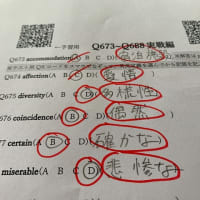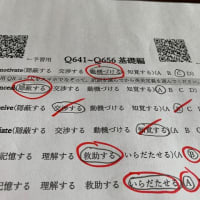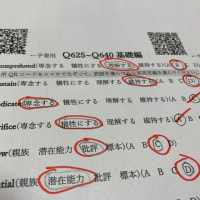「日本人は英語の読み書きは出来るが会話は出来ない」という迷信ほどタチの悪いものはありません。それを裏付けるデータはほとんどなく、逆に「読み書きも会話も芳しくない」ことを裏付けるTOEICスコア等は掃いて捨てるほどあります。
けっして日本人が怠慢だからそうなっているわけではありません。童話や子どもニュースが読めない受験生に社説を読ませるような大学入試とそれに迎合した受験英語教育が、「(相当の時間と手間をかけているにもかかわらず)英語の読み書きも会話も芳しくない日本人」を量産してきた元凶のひとつです。センター試験英語は良問が増えたとはいえ、合格ラインが5~6割といった難しい入試問題に早い段階から取り組んで英語力を伸ばすのはきわめて困難です。まずはやさしいものを速く正確に読む訓練をおすすめします。
そんなわけで、著作権の切れた童話「ドリトル先生航海記」から、シンプルで、大学入試にもTOEICにも英検にも有効な練習問題を作成しています。楽しみながら英語力を伸ばしていただければ幸いです。
コロンで区切られているのが四語選択問題、スラッシュで区切られているのが四語整序問題です。四語選択問題の単語は大学入試、英検、TOEICに共通する重要単語で*印は難易度の目安です。*印が多いほど難しい単語になっています。無印は語法・文法等の問題です。
前回の"I THINK your house is the most interesting house I was ever in," I said as⑲(we set off in) the direction of the town.は、昨年のセンター試験で出題された表現、in the direction ofを含んでいます。こういった重要表現が童話やTIMEFORKIDSのような子どもニュースにはたくさん登場します。
受験英語に迎合せずに受験英語に勝つ方法がないわけではありません。童話や子どもニュースが楽に読めるようになってから一定期間入試問題慣れすれば、基礎力を欠いたライバル達にはまず負けないでしょう。
※(9)の解答①(in)②(certain)③(is to be had)④(extinct)⑤(because)⑥(of help to me)⑦(intelligent)⑧(place to eat in)⑨(see it didn't burn)⑩(room to fetch it)⑪(marvelous)⑫(seeing how surprised I) ⑬(keep house for me)⑭(great deal of trouble)⑯(have you see it)⑰(were found to be)⑱(waiting for me with)⑲(we set off in)⑳(so)
(10)
"It must be splendid," I said, "to be able to talk all the languages of the different animals. Do you think I could ①(only : usually : ever : often) learn to do it?"
"Oh surely," said the Doctor—"with practise. You have to be very ②*(convenient : patient : profound : temporary), you know. You really ought to have Polynesia to start you. It was ③(me / she / gave / who) my first lessons."
"Who is Polynesia?" I asked.
"Polynesia was a West African parrot I had. She isn't with me any more now," said the Doctor sadly.
"Why—is she dead?"
"Oh no," said the Doctor. "She is still living, I hope. But when we reached Africa she seemed so glad to get back to her own country. She wept for joy. And when the time came for me to come back here I had not the ④(to / heart / her / take) away from that sunny land—although, it is true, she did offer to come. I left her in Africa—Ah well! I have missed her ⑤*(rarelly : terribly : narrowly : precisely). She wept again when we left. But I think I did the right thing. She was one of the best friends I ever had. It was she who first gave me the idea of learning the animal languages and becoming an animal doctor. I often ⑥(remained / wonder / she / if) happy in Africa, and whether I shall ever see her funny, old, solemn face again—Good old Polynesia!—A most extraordinary bird—Well, well!"
Just at that moment we heard the noise of some one running behind us; and turning round we saw Jip the dog rushing down the road after us, as fast as his ⑦(him / bring / could / legs). He seemed very excited about something, and as soon as he ⑧(up / came / us / to), he started barking and whining to the Doctor in a ⑨**(competent : peculiar : costly : prominent)way. Then the Doctor too seemed to get all worked up and began talking and making ⑩**(queer : deadly : fierce : crucial) signs to the dog. At length he turned to me, his ⑪(with : face : happiness : shining).
"Polynesia has come back!" he cried. "Imagine it. Jip says she has just arrived at the house. My! And it's five years since I saw her—Excuse me a minute."
He turned as if to go back home. But the parrot, Polynesia, was already flying towards us. The Doctor ⑫**(illustrated : detected : clapped : discarded) his hands like a child getting a new toy; while the swarm of sparrows in the roadway fluttered, gossiping, up on to the fences, highly scandalized to see a gray and scarlet parrot skimming down an English lane.
On she came, straight on to the Doctor's shoulder, where she immediately began talking a steady stream in a language I could not understand. She seemed to have a ⑬(say / terrible / to / lot ). And very soon the Doctor had forgotten all about me and my squirrel and Jip and everything else; till at length the bird clearly asked ⑭(about / him / me / something).
"Oh excuse me, Stubbins!" said the Doctor. "I was ⑮(to : so : listening : interested) my old friend here. We must get on and see this squirrel of yours—Polynesia, this is Thomas Stubbins."
The parrot, on the Doctor's shoulder, ⑯*(prevented : nodded : divorced : competed) gravely towards me and then, ⑰(surprise / to / great / my ), said quite plainly in English,
"How do you do? I remember the night you were born. It was a terribly cold winter. You were a very ⑱*(efficient : ugly : actual : punctual) baby."
"Stubbins is ⑲*(sensible : anxious : indifferent : proper) to learn animal language," said the Doctor. "I was just telling him about you and the lessons ⑳(me / you / when / gave) Jip ran up and told us you had arrived."
解答は次回発表。ご意見、ご要望等はsuzuyasu@wmail.plala.or.jpでも承っております。
けっして日本人が怠慢だからそうなっているわけではありません。童話や子どもニュースが読めない受験生に社説を読ませるような大学入試とそれに迎合した受験英語教育が、「(相当の時間と手間をかけているにもかかわらず)英語の読み書きも会話も芳しくない日本人」を量産してきた元凶のひとつです。センター試験英語は良問が増えたとはいえ、合格ラインが5~6割といった難しい入試問題に早い段階から取り組んで英語力を伸ばすのはきわめて困難です。まずはやさしいものを速く正確に読む訓練をおすすめします。
そんなわけで、著作権の切れた童話「ドリトル先生航海記」から、シンプルで、大学入試にもTOEICにも英検にも有効な練習問題を作成しています。楽しみながら英語力を伸ばしていただければ幸いです。
コロンで区切られているのが四語選択問題、スラッシュで区切られているのが四語整序問題です。四語選択問題の単語は大学入試、英検、TOEICに共通する重要単語で*印は難易度の目安です。*印が多いほど難しい単語になっています。無印は語法・文法等の問題です。
前回の"I THINK your house is the most interesting house I was ever in," I said as⑲(we set off in) the direction of the town.は、昨年のセンター試験で出題された表現、in the direction ofを含んでいます。こういった重要表現が童話やTIMEFORKIDSのような子どもニュースにはたくさん登場します。
受験英語に迎合せずに受験英語に勝つ方法がないわけではありません。童話や子どもニュースが楽に読めるようになってから一定期間入試問題慣れすれば、基礎力を欠いたライバル達にはまず負けないでしょう。
※(9)の解答①(in)②(certain)③(is to be had)④(extinct)⑤(because)⑥(of help to me)⑦(intelligent)⑧(place to eat in)⑨(see it didn't burn)⑩(room to fetch it)⑪(marvelous)⑫(seeing how surprised I) ⑬(keep house for me)⑭(great deal of trouble)⑯(have you see it)⑰(were found to be)⑱(waiting for me with)⑲(we set off in)⑳(so)
(10)
"It must be splendid," I said, "to be able to talk all the languages of the different animals. Do you think I could ①(only : usually : ever : often) learn to do it?"
"Oh surely," said the Doctor—"with practise. You have to be very ②*(convenient : patient : profound : temporary), you know. You really ought to have Polynesia to start you. It was ③(me / she / gave / who) my first lessons."
"Who is Polynesia?" I asked.
"Polynesia was a West African parrot I had. She isn't with me any more now," said the Doctor sadly.
"Why—is she dead?"
"Oh no," said the Doctor. "She is still living, I hope. But when we reached Africa she seemed so glad to get back to her own country. She wept for joy. And when the time came for me to come back here I had not the ④(to / heart / her / take) away from that sunny land—although, it is true, she did offer to come. I left her in Africa—Ah well! I have missed her ⑤*(rarelly : terribly : narrowly : precisely). She wept again when we left. But I think I did the right thing. She was one of the best friends I ever had. It was she who first gave me the idea of learning the animal languages and becoming an animal doctor. I often ⑥(remained / wonder / she / if) happy in Africa, and whether I shall ever see her funny, old, solemn face again—Good old Polynesia!—A most extraordinary bird—Well, well!"
Just at that moment we heard the noise of some one running behind us; and turning round we saw Jip the dog rushing down the road after us, as fast as his ⑦(him / bring / could / legs). He seemed very excited about something, and as soon as he ⑧(up / came / us / to), he started barking and whining to the Doctor in a ⑨**(competent : peculiar : costly : prominent)way. Then the Doctor too seemed to get all worked up and began talking and making ⑩**(queer : deadly : fierce : crucial) signs to the dog. At length he turned to me, his ⑪(with : face : happiness : shining).
"Polynesia has come back!" he cried. "Imagine it. Jip says she has just arrived at the house. My! And it's five years since I saw her—Excuse me a minute."
He turned as if to go back home. But the parrot, Polynesia, was already flying towards us. The Doctor ⑫**(illustrated : detected : clapped : discarded) his hands like a child getting a new toy; while the swarm of sparrows in the roadway fluttered, gossiping, up on to the fences, highly scandalized to see a gray and scarlet parrot skimming down an English lane.
On she came, straight on to the Doctor's shoulder, where she immediately began talking a steady stream in a language I could not understand. She seemed to have a ⑬(say / terrible / to / lot ). And very soon the Doctor had forgotten all about me and my squirrel and Jip and everything else; till at length the bird clearly asked ⑭(about / him / me / something).
"Oh excuse me, Stubbins!" said the Doctor. "I was ⑮(to : so : listening : interested) my old friend here. We must get on and see this squirrel of yours—Polynesia, this is Thomas Stubbins."
The parrot, on the Doctor's shoulder, ⑯*(prevented : nodded : divorced : competed) gravely towards me and then, ⑰(surprise / to / great / my ), said quite plainly in English,
"How do you do? I remember the night you were born. It was a terribly cold winter. You were a very ⑱*(efficient : ugly : actual : punctual) baby."
"Stubbins is ⑲*(sensible : anxious : indifferent : proper) to learn animal language," said the Doctor. "I was just telling him about you and the lessons ⑳(me / you / when / gave) Jip ran up and told us you had arrived."
解答は次回発表。ご意見、ご要望等はsuzuyasu@wmail.plala.or.jpでも承っております。






















※コメント投稿者のブログIDはブログ作成者のみに通知されます